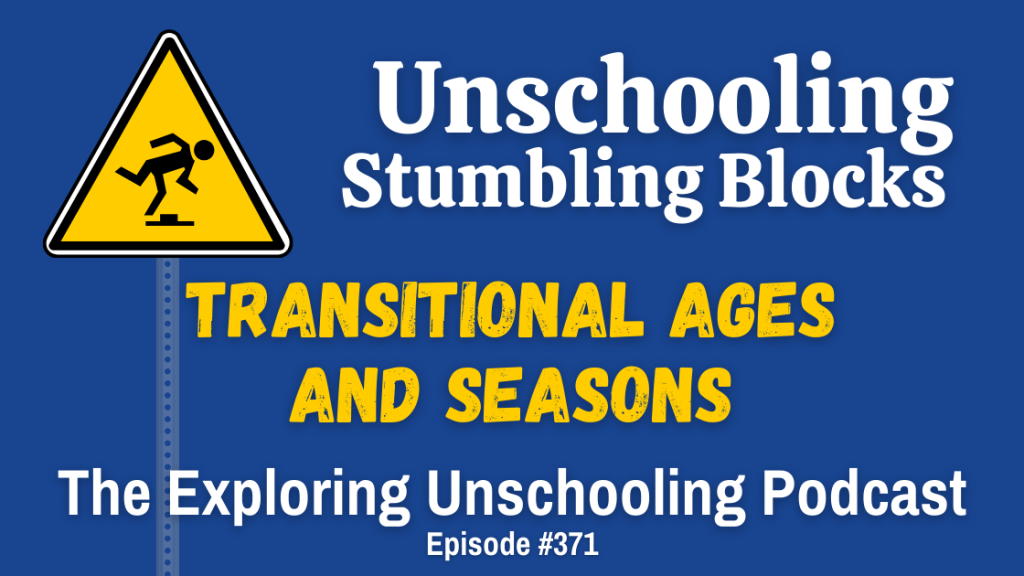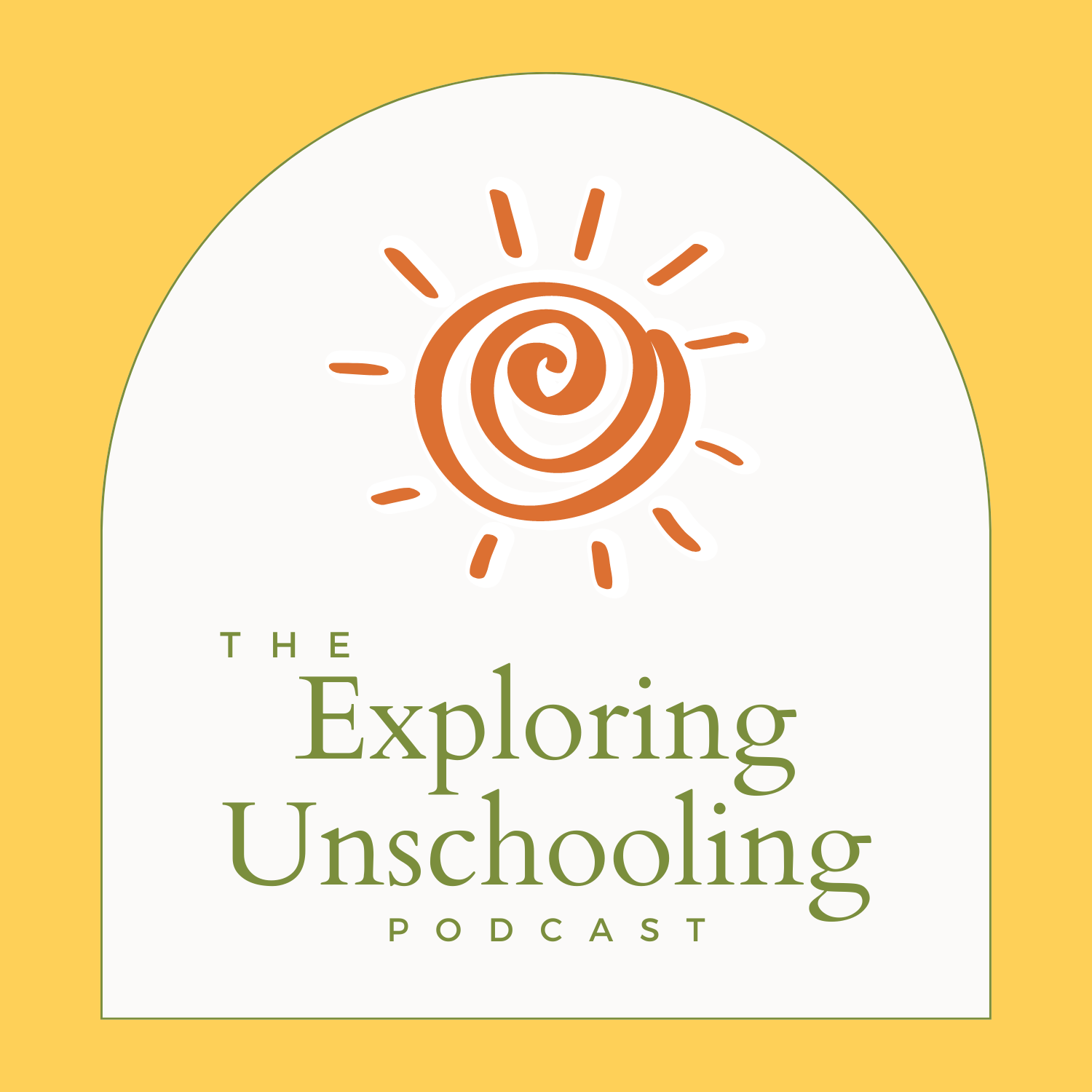EU371: Unschooling Stumbling Blocks: Transitional Ages and Seasons
Description
 </figure>
</figure>We are back with another episode in our Unschooling Stumbling Blocks series and we’re talking about transitional ages and seasons.
While there is definitely not one path through childhood, there are common transitional ages where major changes typically occur. In this episode, we talk about some shifts that happen from the toddler to child years, big kid to preteens, teenage years, and moving into young adulthood. Brain development, body growth, and personality changes can sometimes leave us feeling like we’re meeting a whole new person! We talked about how our unschooling lives help support these transitional times, too, with unconditional love, curiosity, and strong relationships.
It was a really fun conversation and we hope you find it helpful on your unschooling journey!
THINGS WE MENTION IN THIS EPISODE
EU360: What’s So Magical About Age 18?
The Living Joyfully Shop – books, courses, coaching, and more!
Watch the video of our conversation on YouTube.
Follow @exploringunschooling on Instagram.
Follow @pamlaricchia on Instagram and Facebook.
Check out our website, livingjoyfully.ca for more information about navigating relationships and exploring unschooling.
Sign up to our mailing list to receive The Living Joyfully Dispatch, our biweekly email newsletter, and get a free copy of Pam’s intro to unschooling ebook, What is Unschooling?
We invite you to join us in The Living Joyfully Network, a wonderful online community for parents to connect and engage in candid conversations about living and learning through the lens of unschooling. This month, we’re talking about supporting our children’s autonomy. Come and be part of the conversation!
So much of what we talk about on this podcast and in the Living Joyfully Network isn’t actually about unschooling. It’s about life. On The Living Joyfully Podcast, Anna Brown and Pam Laricchia talk about life, relationships, and parenting. You can check out the archive here, or find it in your your favorite podcast player.
EPISODE TRANSCRIPT
ERIKA: Hello everyone! I’m Erika Ellis from Living Joyfully, and I’m joined by my co-hosts, Anna Brown and Pam Laricchia. And today, we’re diving into another unschooling stumbling block, which is transitional ages and seasons. And I’m really excited for this conversation.
But before we begin, I wanted to give a quick plug to the Living Joyfully Network, which has really been life-changing for me in so many ways. On the Network, we have amazing discussions about so many topics, since our community has such a wide variety of experiences. And I just love the community so much, because everyone there is really learning and growing and being so intentional with their families. And I think it can just be such a wonderful support, especially during this back-to-school season, when questions and fears sometimes come up.
And so, if you’d like to learn more about the Network and check it out for yourself, you can visit livingjoyfullyshop.com and click on the community tab. We also have a link in the show notes. And we would love to meet you! So, Pam, would you like to get us started?
PAM: Sure. I absolutely would. And yeah, I am really looking forward to diving into these transitional ages and seasons. Because in our experience, we have really seen it play out in many, many different unschooling families over the years that there are patterns of these transitional seasons or ages as our children just move through these different stages of their lives. And these can be challenging times for our child and for us as things change. Because change is a constant, but also a challenge, because we’re figuring new things out. And I just want to mention, it’s less about actual ages. We’re not going to say, at this age or at this age, what your child should be doing. But it’s more about when the particular child experiences the shift. And that these shifts are part of life. So, that’s why we really wanted to dive into them. And we thought we’d start with the transition from toddler to child.
And now, thinking back, it’s been a while now, but with younger kids, a lot of our time and effort is taken up with hands-on care, from changing diapers to making food, to managing toys and games, and keeping them occupied. And their learning is quite transparent. We see them exploring their environment. We see them learning how to use their toys. We see them learning how to eat, learning how to talk, walk, like all those pieces.
So, as they start to get a little bit older, they typically need less hands-on care. And it becomes more about supporting them as they pursue their curiosity and their interests. And while it can still be busy for us, because we’re shifting from keeping them alive to being more engaged in the activities that they want to do day to day, it can be a bit of a challenge for us to notice that, to start giving them that space to make some more choices that they might be interested in. So, in the past, we’ve been able to help them and it’s just flowed. And now they might be more resistant. And we may start to recognize that they may think or want to do things differently than us.
It’s just really fascinating. And it can be tricky for us also, because they are still so much in the moment. They want to play this thing, they want to do this thing. They are right there. And we need to spend a lot of time learning about each other and just finding our rhythms, because it’s less about us when we bring the food out. Now they can be more actively saying, I’m hungry now. Just all those little pieces. Or, I’m not tired. Now that they’re more verbal, they have more ways to express their feelings and their thoughts and so, we learn to step back a little bit and work with them and learn more about them. And it’s a really fun time, but definitely can be a transition.
ANNA: Right. And I think, with the younger kids, with babies and toddlers, I mean, it’s such an intense time. Because we’re tired and we’re maybe not getting much sleep. And it is a lot about just keeping this little human alive. And there’s so much joy there and so much delight. And this transition happens and our days look a little bit different and we can start to recognize that pushback. So, I love the way you said that. Because I think especially for those of us who are doing a lot of the caretaking of the children, we’re just so connected to those babies and toddlers in many ways. And it’s such a dependent relationship. And then you start to see that independence and agency asserting itself and they do look at the world a little bit differently.
And then we start seeing that people are different. And honestly, I believe even babies and toddlers will assert themselves, but it does have a different feel to it. When getting a little bit older, and I think for those of us who we’re talking about in an unschooling environment, when it becomes that more typical school age or preschool age, we start to kind of go, wait. Should we be doing these things or should it look a different way?
I read John Holt really early on. He was influential in my journey with this. And I love just looking at that toddler and very young child and seeing how much they were learning and seeing how natural it was to learn a language and cultural expectations and understandings and all of these pieces and recognize that that’s just something as humans we can carry through. But I think it is important to watch in ourselves, are we bringing something to it?
Because it’s like, okay, now they would be meeting this milestone, or they should be doing this or this, looking externally versus looking at the child in front of you. So, I think there’s a lot of things that go on with this transition, both in our heads and for the actual child that’s growing and cha





